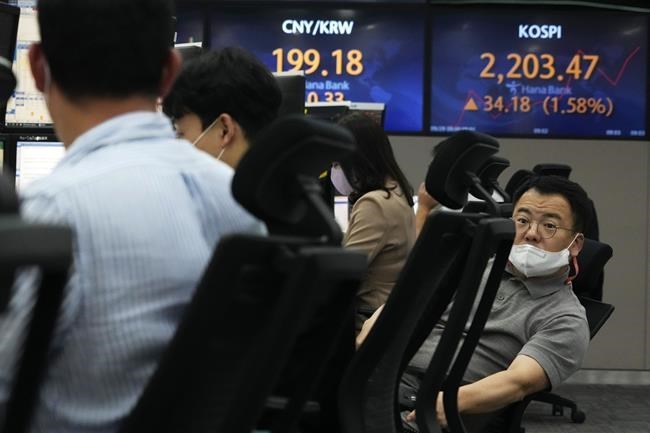BEIJING (AP) — Asian stock markets followed Wall Street higher Thursday after Britain's central bank moved forcefully to stop a budding financial crisis.
Market benchmarks in Hong Kong, Seoul and Sydney added more than 1%. Shanghai and Tokyo also rose. Oil prices edged lower after jumping by more than $3 per barrel the previous day.
Wall Street's benchmark S&P 500 index surged 2% on Wednesday for its biggest gain in seven weeks after the Bank of England announced it would buy as many government bonds as needed to restore order to financial markets.
That helped to calm investor fears that planned British tax cuts would push up already high inflation. That had caused the value of the British pound to fall to its lowest level since the 1970s and bond prices to plunge.
The Shanghai Composite Index rose 0.8% to 3,068.87 and the Nikkei 225 in Tokyo gained 0.6% to 26,341.76. The Hang Seng in Hong Kong jumped 1.3% to 17,477.97.
The Kospi in Seoul gained 1.1% to 2,193.82 and Sydney’s S&P ASX 200 rose 1.6% to 6,566.80.
New Zealand and Southeast Asian markets also advanced.
On Wall Street, the S&P 500 rose to 3,719.04 after the Bank of England said it would buy bonds over the next two weeks to stop a slide in prices. Investors were rattled by plans for 45 billion pounds ($48 billion) of tax cuts with no spending reductions.
The central bank earlier warned crumbling confidence in the economy posed a “material risk to U.K. financial stability.” The International Monetary Fund took the rare step of urging a member of the Group of Seven advanced economies to abandon its plan for tax cuts and more borrowing.
The Dow Jones Industrial Average rallied 1.9% to 29,683.74. The Nasdaq composite climbed 2.1% to 11,051.64.
Despite Wednesday's gain, the S&P 500 is down more than 20% from its Jan. 3 record, which puts it in what traders call a bear market.
Forecasters see more turbulence ahead due to worries about a possible recession, higher interest rates and even higher inflation.
The yield on the 10-year U.S. Treasury, or the difference between its market price and the payout if held to maturity, briefly exceeded 4% on Wednesday, its highest level in a decade.
Investor fears are growing that aggressive interest rate hikes this year by the Federal Reserve and central banks in Europe and Asia to cool inflation that is at multi-decade highs might tip the global economy into recession.
The investment giant Vanguard puts the chance of a U.S. recession at 25% this year and at 65% next year if the Fed follows through on expectations it will raise rates again and keep them elevated through next year.
In energy markets, benchmark U.S. crude lost 32 cents to $81.83 per barrel in electronic trading on the New York Mercantile Exchange. The contract surged $3.65 on Wednesday to $82.15. Brent crude, the price basis for international oils, shed 30 cents to $87.75 per barrel in London. It gained $3.05 the previous session to $89.32.
The dollar gained to 144.32 yen from Wednesday's 143.96 yen. The euro declined to 96.82 cents from 97.43 cents.
Joe Mcdonald, The Associated Press




